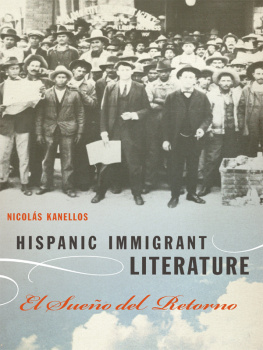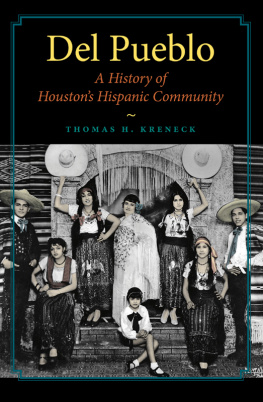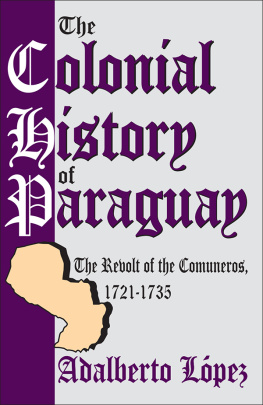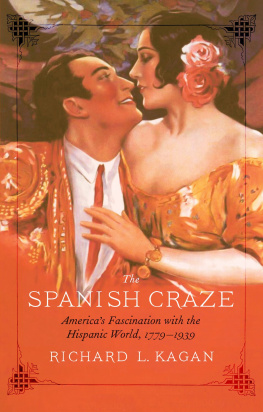Nicolás Kanellos - Hispanic Immigrant Literature: El Sueño del Retorno
Here you can read online Nicolás Kanellos - Hispanic Immigrant Literature: El Sueño del Retorno full text of the book (entire story) in english for free. Download pdf and epub, get meaning, cover and reviews about this ebook. year: 2011, publisher: University of Texas Press, genre: Politics. Description of the work, (preface) as well as reviews are available. Best literature library LitArk.com created for fans of good reading and offers a wide selection of genres:
Romance novel
Science fiction
Adventure
Detective
Science
History
Home and family
Prose
Art
Politics
Computer
Non-fiction
Religion
Business
Children
Humor
Choose a favorite category and find really read worthwhile books. Enjoy immersion in the world of imagination, feel the emotions of the characters or learn something new for yourself, make an fascinating discovery.
- Book:Hispanic Immigrant Literature: El Sueño del Retorno
- Author:
- Publisher:University of Texas Press
- Genre:
- Year:2011
- Rating:3 / 5
- Favourites:Add to favourites
- Your mark:
- 60
- 1
- 2
- 3
- 4
- 5
Hispanic Immigrant Literature: El Sueño del Retorno: summary, description and annotation
We offer to read an annotation, description, summary or preface (depends on what the author of the book "Hispanic Immigrant Literature: El Sueño del Retorno" wrote himself). If you haven't found the necessary information about the book — write in the comments, we will try to find it.
The first comprehensive study of literary works created both orally and in writing by immigrants to the United States from the Hispanic world since the early nineteenth century.
Hispanic Immigrant Literature: El Sueño del Retorno — read online for free the complete book (whole text) full work
Below is the text of the book, divided by pages. System saving the place of the last page read, allows you to conveniently read the book "Hispanic Immigrant Literature: El Sueño del Retorno" online for free, without having to search again every time where you left off. Put a bookmark, and you can go to the page where you finished reading at any time.
Font size:
Interval:
Bookmark:
HISPANIC IMMIGRANT LITERATURE
JOE R. AND TERESA LOZANO LONG SERIES IN
LATIN AMERICAN AND LATINO ART AND CULTURE
El Sueo del Retorno
BY NICOLS KANELLOS

All photos and illustrations are courtesy of Recovering the U.S. Hispanic Literary Heritage, University of Houston.
Copyright 2011 by the University of Texas Press
All rights reserved
Printed in the United States of America
First edition, 2011
Requests for permission to reproduce material from this work should be sent to:
Permissions
University of Texas Press
P.O. Box 7819
Austin, TX 78713-7819
www.utexas.edu/utpress/about/bpermission.html
 The paper used in this book meets the minimum requirements of ANSI/NISO Z39.48-1992 (R1997) (Permanence of Paper).
The paper used in this book meets the minimum requirements of ANSI/NISO Z39.48-1992 (R1997) (Permanence of Paper).
LIBRARY OF CONGRESS CATALOGING-IN-PUBLICATION DATA
Kanellos, Nicols.
Hispanic immigrant literature : el sueo del retorno / by Nicols Kanellos. 1st ed.
p. cm. (Joe R. and Teresa Lozano Long series in Latin American and Latino art and culture)
Includes bibliographical references and index.
ISBN 978-0-292-72640-6 (cloth : alk. paper)
ISBN 978-0-292-72996-4 (E-book)
1. American literatureHispanic American authorsHistory and criticism. 2. Immigrants writings, AmericanHistory and criticism. 3. Hispanic Americans in literature. 4. Emigration and immigration in literature. 5. Immigrants in literature. I. Title.
PS153.H56K35 2011
860.9868073dc22
2011003822
FOR ALL THE IMMIGRANTS I GREW UP WITH AND
AS ALWAYS FOR MY LOVING WIFE, CRISTELIA,
AND MY BELOVED SON, MIGUEL JOS.
HISPANIC IMMIGRANT LITERATURE
IMMIGRATION HAS BEEN a basic reality of life for Latino communities in the United States since the nineteenth century. It has been not only a sociocultural reality but also a powerful determinant of the Latino or Hispanic vision of the world. The impact of successive generations of immigrants, originating principally in Mexico and the Caribbean but also in Spain and Central and South America, has left an indelible mark on the psyche of Hispanic minorities in the United States. Persistent immigration has also reinvigorated and even changed the cultural character of the Hispanic communities in this country. As Paul White has argued, Migration, dislocation and ensuing marginality are some of the most important influences subverting long-standing beliefs in the linearity of progress and the stability of cultural identity, and that these have been determining influences on the inner conditions of contemporary humanity (6). It is no wonder that one of the most important themes in Hispanic literature is immigration and that it has given rise to a specific type of literature while defining what it means to be Hispanic in the United States.
Like all themes that arise from the grass roots of society and permeate many aspects of daily life, the theme of the Hispanic immigrant in the grand Metropolis or the Colossus of the North first arises in the immigrant imaginary in oral lore as personal experience narratives and anecdotes and spreads with characteristic vernacular articulation to jokes, songs, and such popular theatrical forms as vaudeville. Long before literary works based on immigrant life appeared in books, Spanish-language newspapers began collecting and printing these jokes, anecdotes, and tales of misfortune of the greenhorns come to the Metropolis. It is not surprising that the first Hispanic novel of immigration, Lucas Guevara, by the Colombian writer Alirio Daz Guerra, ).
All of the works cited above are tales about greenhorn immigrants who come to the big city to improve their livesthat is, to seek their fortunes in the land of opportunitybut who in the end become disillusioned by what the authors or their narrators see as the ills of American society: oppression of the working class, racial discrimination, the underworld and the underclass culture, and a capitalism that erodes Hispanic identity and values, including family, religion, machismo, language, and culture. In this way, Spanish-language immigrant literature opposes and deconstructs the myth of the American Dream, as opposed to the reinforcement and celebration of the American Dream that usually appears in the English-language ethnic autobiography written by the children of immigrants, for example, Julia Alvarez, Oscar Hijuelos, Esmeralda Santiago, and Victor Villaseor. In fact, Spanish-language immigrant novels are written by the immigrants themselves, not by their children, and their texts thereby take on additional historical authenticity. In contrast to these are the stories re-created from inherited family sagas or remembered from the time the authors themselves came to the United States as young children and became acculturated in the Metropolis.
Lucas Guevara initiates the ethos and structure that will be repeated in many of the works cited above:
A naive Hispanic immigrant filled with high expectations and fascinated by the advanced technology and progress of the Metropolis ultimately becomes disillusioned with the United States.
The greenhorn, not knowing sophisticated city ways, becomes the victim of numerous abuses by the authorities, petty criminals, and hucksters as well as by the bosses and foremen where he works.
The narrators reject the materialism and supposed superiority of the Metropolis and embrace essentialist Latino cultural values and identity, a reversal which eventually leads them to return to their homelands. Those who remain in the Metropolis, as in Lucas Guevara and La carreta, will either diepoetic justice for their betrayal of national values and idealsor, having been corrupted and transformed by the materialist, corrupt culture of the United States, will cease to exist as representatives of their nation. In El sol de Texas, for example, those who remain are compared negatively with the true Mexicans who return to the patria.
Often the plot of immigrant novels and plays is a vehicle for occasionally biting criticism of Metropolitan culture: the lack of ethical standards, the prevalence of racial discrimination, the rampant sense of superiority to Latinos and their culture, and a hypocrisy endemic among Anglos. The Metropolis is seen as Babylon or Sodom and Gomorrah, and Anglos are the corruptors of Latino innocence. Their money perverts everything. The technological marvels of their advanced civilization destroy humanism, dignity, and respect. They consider the Hispanic immigrant as nothing more than a beast of burden, or camello (camel), on whose back the technological marvels are built. The immigrants compare themselves to the slaves of Babylon, Egypt, and the Old South. Their foremen are slave drivers.
Cultural nationalism prevails in these works, and it tends to protect and preserve the Catholic religion, the Spanish language, and Hispanic customs threatened with assimilation. At times, however, the severest criticism is reserved for Latinos who have adopted Anglo-American cultural ways and consequently are seen as cultural traitors. They are denigrated as agringados (gringoized), renegados (renegades), pochos (no longer Mexicans) and pitiyanquis (petit Yankees).
Frequently the American female comes to represent the Metropolis, its amoral sexuality and liberalism, its materialism and erotic attraction for Latino males, while Latinas often represent the immigrants national values of family, religion, and culture, even the homeland. When Latinas become assimilated in these narratives, theirs is seen as the greatest betrayal of the nation.
Next pageFont size:
Interval:
Bookmark:
Similar books «Hispanic Immigrant Literature: El Sueño del Retorno»
Look at similar books to Hispanic Immigrant Literature: El Sueño del Retorno. We have selected literature similar in name and meaning in the hope of providing readers with more options to find new, interesting, not yet read works.
Discussion, reviews of the book Hispanic Immigrant Literature: El Sueño del Retorno and just readers' own opinions. Leave your comments, write what you think about the work, its meaning or the main characters. Specify what exactly you liked and what you didn't like, and why you think so.






